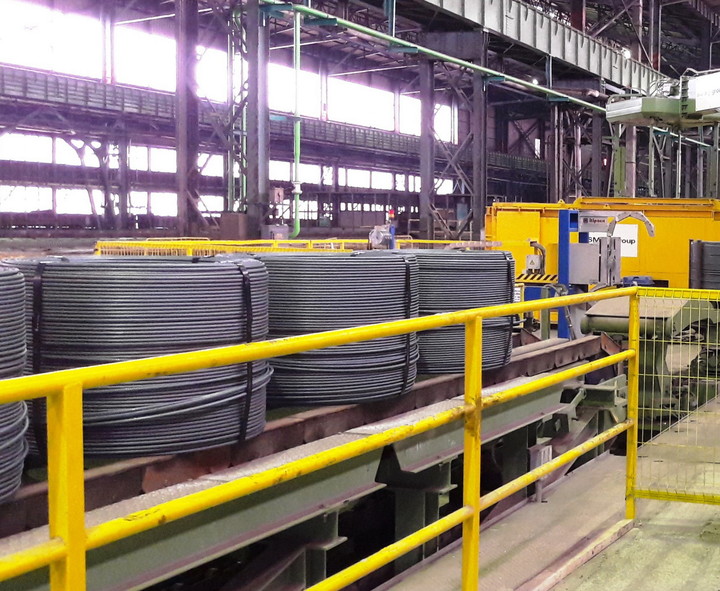
Arcelormittal Zenica D.O.O. Produces compact rebar coils on new vcc® line from SMS Group

The VCC® (Vertical Compact Coiler) line, which SMS group supplied to ArcelorMittal Zenica d.o.o., Bosnia and Herzegovina, has successfully passed its performance tests. The new line has been designed to produce compact coils at an hourly throughput of 60 tons.
The VCC® line features state-of-the art spooling technology. It spools the rolling stock inline into compact coils. Nowadays, processors require stable, compact and easy-to-process coils. This means that many conventional plants with wire rod blocks and laying heads are more and more often required to recoil their hot rolled coils into compact coils. With the new VCC® line, ArcelorMittal Zenica d.o.o. can now produce compact coils directly inline in a fully automatic process, which minimizes human supervisory work during production. This saves time and HR costs.

The new VCC® line (Vertical Compact Coiler) at ArcelorMittal Zenica d.o.o., Bosnia and Herzegovina, which operates at a throughput of 60 tons per hour.
The mechanical properties are carefully controlled by a set of soft cooling boxes. This not only permits fine tuning of the properties along the entire bar length, but also an immediate switch from the straight to the spooling line. Thanks to this system, each individual coil could be produced in a fast and smooth manner.
The vertical spooling technology developed by SMS group has additional advantages over horizontal designs: the equipment is simpler, easier to install and requires less maintenance. Also the installation effort, including conversion work, is lower.
“We are proud of the successful startup of this new line in the Zenica bar mill,” stated dr. Mustafa Imamovic, Director of Project and Capex department at ArcelorMittal Zenica d.o.o. “It is a very important investment which will increase our competitiveness throughout the European market.”
The project was implemented by SMS group S.p.A. in cooperation with ArcelorMittal Zenica d.o.o. While SMS group took care of the equipment supply and installation, ArcelorMittal Zenica d.o.o. was responsible for the civil works.
The smooth interaction between the existing and the newly supplied equipment proved to be an important key to the success of this project, which was completed within the timeframe of one and a half years specified by the customer.


Trump weighs using $2 billion in CHIPS Act funding for critical minerals

Codelco cuts 2025 copper forecast after El Teniente mine collapse

Electra converts debt, launches $30M raise to jumpstart stalled cobalt refinery

Barrick’s Reko Diq in line for $410M ADB backing

Abcourt readies Sleeping Giant mill to pour first gold since 2014

Nevada army depot to serve as base for first US strategic minerals stockpile

SQM boosts lithium supply plans as prices flick higher

Viridis unveils 200Mt initial reserve for Brazil rare earth project

Tailings could meet much of US critical mineral demand – study

Kyrgyzstan kicks off underground gold mining at Kumtor

Kyrgyzstan kicks off underground gold mining at Kumtor

KoBold Metals granted lithium exploration rights in Congo

Freeport Indonesia to wrap up Gresik plant repairs by early September

Energy Fuels soars on Vulcan Elements partnership

Northern Dynasty sticks to proposal in battle to lift Pebble mine veto

Giustra-backed mining firm teams up with informal miners in Colombia

Critical Metals signs agreement to supply rare earth to US government-funded facility

China extends rare earth controls to imported material

Galan Lithium proceeds with $13M financing for Argentina project

Kyrgyzstan kicks off underground gold mining at Kumtor

Freeport Indonesia to wrap up Gresik plant repairs by early September

Energy Fuels soars on Vulcan Elements partnership

Northern Dynasty sticks to proposal in battle to lift Pebble mine veto

Giustra-backed mining firm teams up with informal miners in Colombia

Critical Metals signs agreement to supply rare earth to US government-funded facility

China extends rare earth controls to imported material

Galan Lithium proceeds with $13M financing for Argentina project

Silver price touches $39 as market weighs rate cut outlook

















